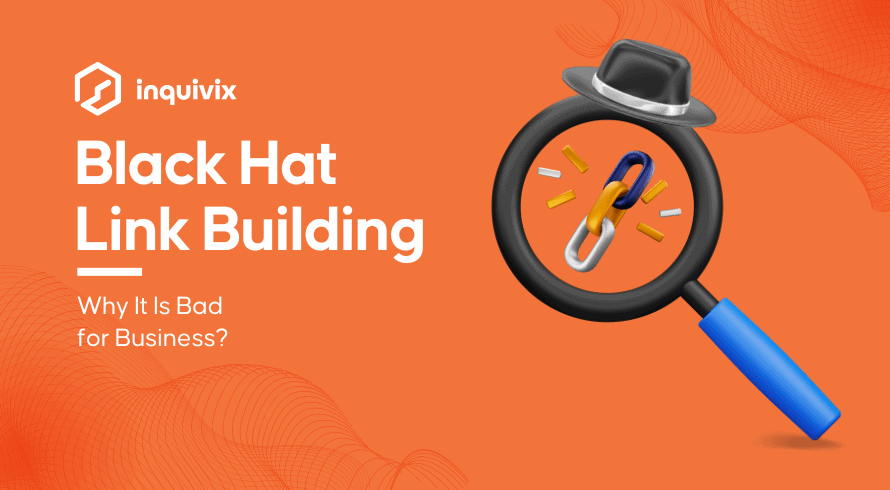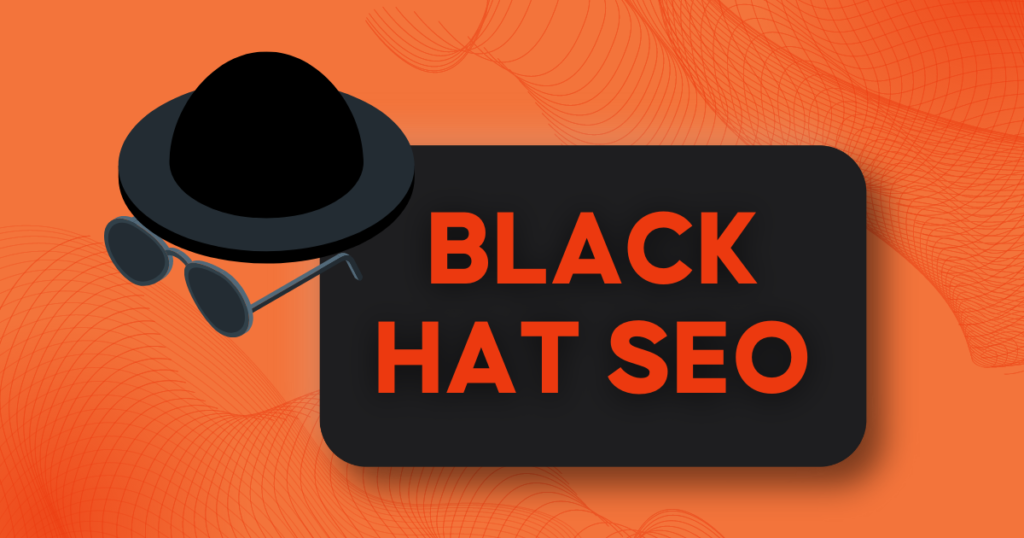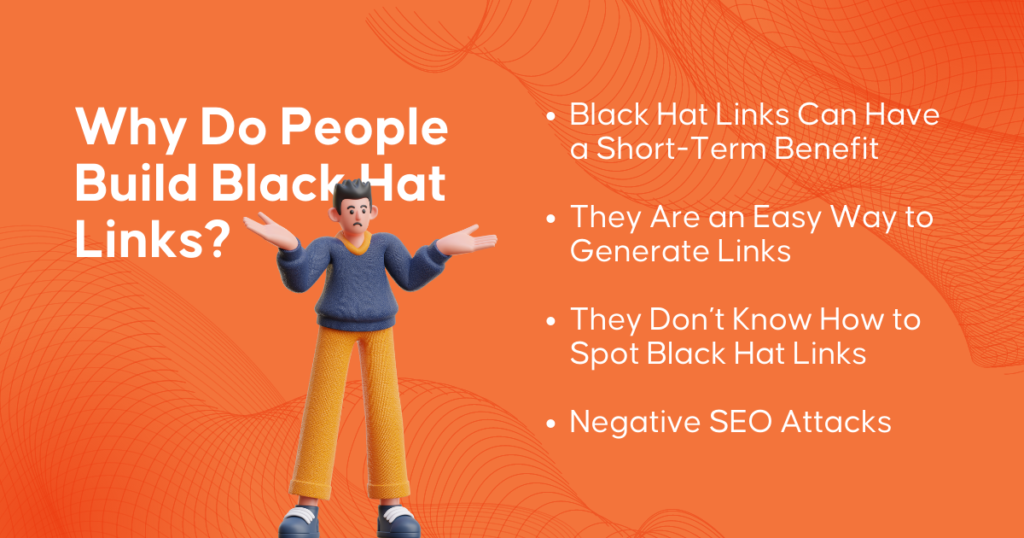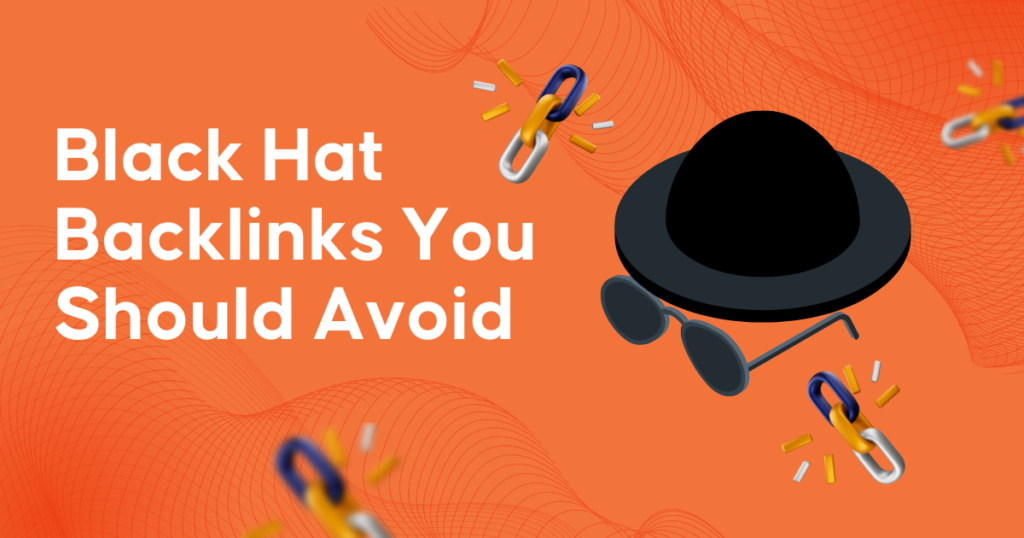Inquivix HQ
1-903, 18 Eonju-ro 146-gil,
Gangnam-gu, Seoul, Korea
06057

Many site owners and SEOs are using black hat link-building tactics without knowing the risks involved. Many techniques can be used for link building, but not all of them are good for your business. In fact, some black hat link-building strategies can actually hurt your SEO efforts and harm your web presence. Learn about the dangers of black hat link building and how to stay safe while creating links.
What Is Black Hat Link Building?

Black hat link building is a type of link building that uses techniques that exploit website loopholes to drive traffic to a website or to rank higher in search engine results than it should. These techniques include creating links from low-quality websites, buying links, and using automated programs to generate links.
While this may sound like a good way to get ahead, it can lead to long-term damage for both the website and the business that it represents. Google and other major search engines are constantly evolving their algorithms to weed out these types of practices, and they will not hesitate to penalize websites that engage in them. As a result, black hat link building is best avoided altogether.
Why Do People Build Black Hat Links?

Black hat linking is the practice of building links on sites with the sole purpose of manipulating search engine rankings. These links are often low-quality, spammy, or completely irrelevant to the site they’re pointing to. So why do people do it?
Black Hat Links Can Have a Short-Term Benefit
While the long-term benefits of building white hat links are well-known, the short-term benefits of black hat links can be tempting for some people. After all, if you can quickly and easily build a bunch of links that will help your website rank higher in search engine results, why wouldn’t you do it?
The problem is that these links are often discovered by Google and other search engines, resulting in penalties that can do serious damage to your website’s ranking. In addition, black hat links are often much less effective than white hat links in the long run. So while they may offer a quick boost in the short term, they’re not likely to lead to sustained success over time.
They Are an Easy Way to Generate Links
Some people build black hat links because they’re an easy way to generate links. Building links is a time-consuming process, so it’s much easier to just buy links from a link farm. These link farms are usually created for the purpose of selling links, and they don’t care about the quality of the links that they sell. As a result, these links often have very little value.
But there are some people who believe that black hat links can be valuable if they’re done correctly. These people view link building as a game, and they try to find ways to game the system. By building lots of low-quality links, they can increase their chances of ranking higher in the search results.
They Don’t Know How to Spot Black Hat Links
The reasons people build black hat links are as diverse as the tactics themselves. In some cases, the link builder may simply not know that they’re engaging in black hat SEO. This is especially true if they’re new to the industry or haven’t kept up with the latest changes in Google’s algorithm. To the untrained eye, a black hat link can often look the same as a white hat link. As a result, many people mistakenly believe that they are building links ethically when in reality they are engaging in black hat practices.
Negative SEO Attacks
One of the most common reasons people build black hat links is for negative SEO attacks. This is when someone points low-quality links toward a website in an effort to reduce its search engine rankings. The thinking behind this is that if the target website’s ranking goes down, then the attacker’s website will rise in the rankings. Unfortunately, this tactic can often backfire, as Google and other search engines are getting better at detecting and penalizing these types of activities. As a result, it’s generally not worth the risk to try and attack another website using black hat links.
Why Black Hat Link Building Is Bad for Business
Black hat link building is the process of artificially inflating a website’s link popularity in an attempt to improve search engine rankings. While this may initially appear to be an effective strategy, it can ultimately have a huge negative effect on a website’s search results.
Penalized by Google and Other Search Engines
Google and other major search engines are constantly working to identify and penalize websites that engage in black hat link building. As a result, businesses that rely on these tactics eventually find their website buried in the search results, with little chance of ever recovering their previous ranking. Google explicitly states in its Webmaster Guidelines that “Participating in link schemes” is a violation of their guidelines. They define a link scheme as “any behavior that manipulates links pointing to your own site or outgoing links.
Lost of Trust from Users and Search Engines
Furthermore, black hat link building can lead to a loss of trust from both users and search engines, further damaging a website’s reputation. The users will be misled by the black hat link-building techniques and might not trust the website anymore. As for the search engines, they will eventually catch on to the black hat link building and penalize the website accordingly.
So, what can businesses do instead?
The best way to build links is through earning them organically. This means creating high-quality content. For these reasons, it is always best to avoid black hat link-building techniques and focus on building quality links through more ethical means.
Black Hat Backlinks You Should Avoid

There are many types of black hat backlinks out there. Here are some of the most common out of them that you should avoid.
Private Blog Networks (PBNs)
Private Blog Networks, or PBNs, is a type of black hat backlink that should be avoided. PBNs are created when an individual or organization (usually black hat link builders) creates a network of blogs, all of which link back to their main website. This artificially inflates their link popularity and can result in a penalty from Google. In addition, PBNs are often low-quality websites that offer little value to users. As a result, they provide little benefit to the sites they link to and can harm your SEO efforts.
Spamming Blog Comments
One of the easiest ways to get backlinks is to leave comments on other people’s blog posts. However, this method can also be abused, and it’s important to avoid leaving spam comments that don’t contribute to the discussion. This involves leaving comments on blogs that are irrelevant to the post or adding comments that are clearly advertisements.
Not only is this bad blogging etiquette and incredibly annoying for blog readers, but it can also result in your comment being flagged as spam and your link being removed. If you’re going to leave comments on other blogs, make sure that your comments are thoughtful and add to the conversation. Otherwise, you’re better off not bothering.
Low-Quality Guest Posts
A guest post is when someone writes an article for your website. This can be a great way to get some high-quality content for your site – but only if the guest author is someone who knows what they’re doing. If you allow just anyone to write a guest post for your site, you’re opening yourself up to a world of hurt. Low-quality guest posts are filled with spelling and grammar errors, they offer no real value to your readers, and worst of all, they can contain links to spammy or inappropriate websites. Not only will these guest posts damage your website’s reputation, but they can also get you penalized by Google. So if you’re looking for quality backlinks, steer clear of low-quality guest posts!
Cloaking
Cloaking is a black hat SEO technique in which the content presented to the search engine spider is different from that shown to the user’s browser. This is usually done by delivering content based on the IP address of the user requesting the page. For example, a cloaking scheme might show one version of a page to users coming from a Google IP address and another version of the page to users coming from all other IP addresses.
Cloaking is considered a black hat technique because it attempts to deceive search engines. It can also be used to serve malware or unwanted content to users, which is why it’s important to avoid links from sites that use cloaking.
Devious Redirects
Black hat SEO techniques also include devious redirects. This is a link that sends users to a different page than the one they were expecting. Devious redirects are often used to send users to low-quality websites full of spammy content. This can hurt your website’s reputation and cause your ranking to suffer.
Purchasing Low-Quality Backlinks
As the saying goes, “you get what you pay for.” That’s especially true when it comes to black hat backlinks. While it may be tempting to save a few bucks by purchasing low-quality backlinks, doing so will likely do more harm than good. These links are often created using automated software and can easily be detected by search engines. As a result, your website could be penalized for using them. In addition, these links typically come from spammy and low-quality websites, also called link farms. Linking to these sites could damage your own website’s reputation. So, while buying black hat backlinks may seem like a quick and easy way to boost your site’s ranking, it’s not worth the risk.
Why You Should Hire Inquivix for Your Link Building
Black hat link building is bad for your business for many reasons. Not only can you get penalized by Google, but you may also ruin your reputation with customers and other businesses. Furthermore, black hat link-building techniques are often ineffective and can even damage your website’s search engine ranking. You should avoid any type of black hat link building and focus on creating high-quality links that will help your website rank higher on search engine results pages. And that’s where Inquivix can help you.
Inquivix is the leading digital marketing agency with years of experience. We know how to get your website to the top of the search engines. We use only white hat link-building techniques following search engine guidelines, which means your website will never be penalized by Google. We have a team of highly skilled link builders who are experts at getting high-quality links. And because we’re a full-service SEO agency, we can also help you with other aspects of your SEO, such as content marketing and social media marketing. So if you’re looking for a company that can help you with all aspects of your SEO, Inquivix is the right choice. Contact us today to learn more about our services.
FAQs
In the early days of SEO, these practices were often effective at delivering quick results. However, as search engines have become more sophisticated, they have been increasingly able to detect and penalize sites that use black hat SEO. As a result, black hat SEO is no longer an effective way to improve SERP rankings. While it may still work in some cases, the risk of being caught and penalized by search engines is simply too high. Ultimately, it is much better to focus on white hat SEO strategies that will deliver long-term results.
When it comes to SEO, there are two main schools of thought: black hat and white hat. Black hat SEO tactics are those that focus on manipulating search engine algorithms to achieve a higher ranking which we have discussed in detail above. White hat SEO, on the other hand, focuses on providing quality content and building links organically. This may take longer to achieve results, but it is more sustainable in the long run.
